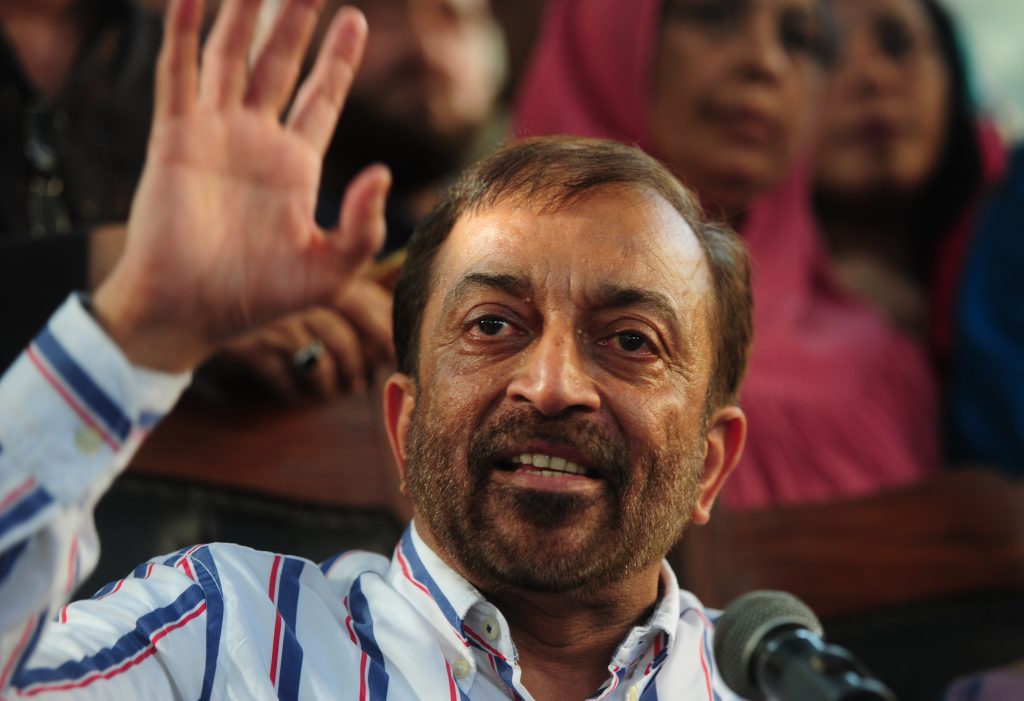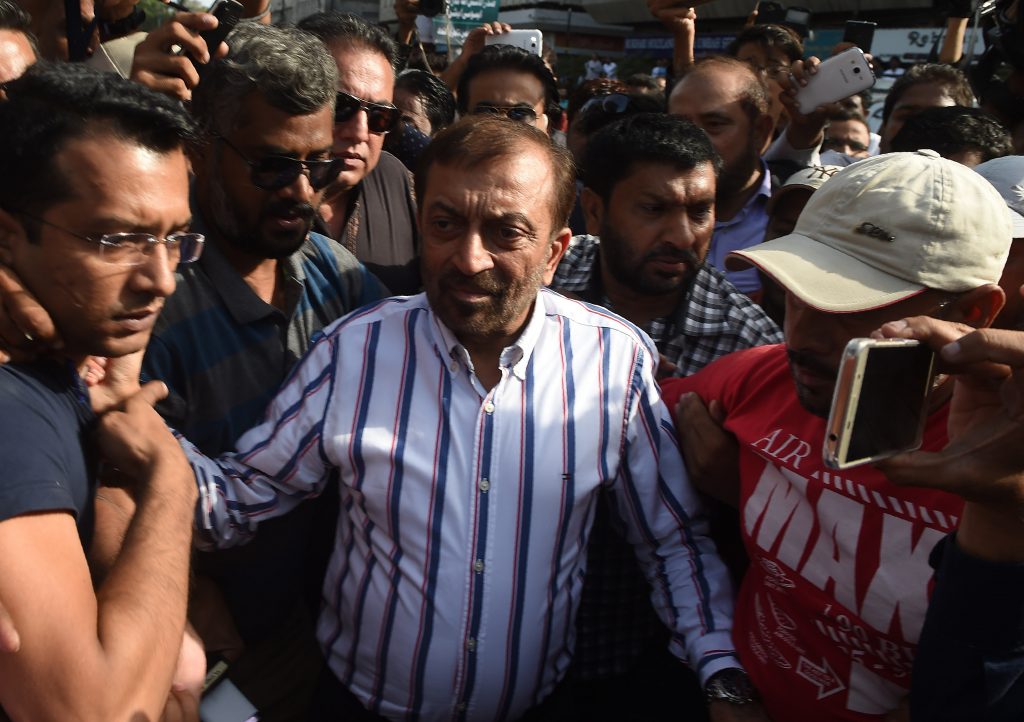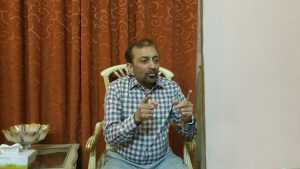“Altaf Hussain has transgressed all limits” – Farooq Sattar
By Ali Arqam and Yousuf Sajjad | Newsbeat National | Published 9 years ago
August 22 was the sixth day of your party’s hunger strike, and you seemed to have made some headway with both, the Federal Interior Minister, Pervez Rashid, and Sindh Chief Minister, Murad Ali Shah coming to meet you. What then prompted Altaf Hussain’s sudden tirade against Pakistan and his exhortations to his supporters to embark on an orgy of violence and destruction that culminated in the sorry state the MQM is in now?
I would describe Mr. Hussain’s speech as seditious and as an act of suicide by the founder of the party. It put us in a state of shock, and the shock was followed by a state of depression and demoralisation — and that’s an understatement. All of us from the party, voters and supporters, and Mohajirs in general, suddenly felt we had been put in the dock. People from across Pakistan were maligning us, talking of us as traitors, as people who had committed a huge crime.
What steps did you take to effect damage control?
I kept an eye on events as they unfolded, and tried to analyse the reaction from across Pakistan. I shared my findings with Khawaja Izhar-ul-Hassan, who had contacted me. We were on the same page. We knew we had to do something: a line had been drawn in London, and we had to draw a line here. This was an extraordinary situation and required an extraordinary response. Then Khwaja Sohail Mansoor, one of the MQM MNAs, Deputy Mayor Arshad Vohra, and Sanjay Parwani approached me. I decided we should go to the Karachi Press Club and address the issue at hand. I thought we should make clear our personal reaction and the party reaction to what had transpired. At that point, we did not know whether the local Rabita Committee was with us or not.
I had already spoken to Shahzeb Khanzada, and Pervez Rashid, the Federal Minister for Information, told them how contrite we were because of what had happened, and categorically denounced Mr. Hussain’s anti-Pakistan harangue, the subsequent violence, and the attack on TV channels. I also told them that we were taking charge of the party from now onwards, that we would run the party, make our own decisions and not take dictation from London.
The Rangers officials did not allow me to talk, even for two minutes. They took us into their custody and you must have seen they way they were treating us. The Rangers held us for eight hours. During this time they sought our help to identify the people who were raising anti-state slogans and those involved in the violence who were caught on camera.
Why did you feel the need to speak to the Federal Information Minister?
I had a meeting with him on August 22, and he had listened to us and assured us that all issues would be resolved after our meeting with Prime Minister Nawaz Sharif, which was scheduled to be held on August 25. After the August 22 incident I felt I should call him and tell him quite unequivocally that I was sorry because despite our political engagement with the centre and the province, and the government’s assurances the same day, Mr. Hussain had gone haywire, and had lost control. His rant and behaviour was incomprehensible to us. I also told him that Mr. Hussain had transgressed all limits and was no longer acceptable; that we were going to do something about it.
You had faced problems arising from Altaf Hussain’s statements for a long time, but rather than part ways with him then, you only went out and did damage control. Why did it take so long to finally call it a day with him?
We had been worried about the consequences of his statements before. It was felt that Mr Hussain’s attitude and decision-making had become erratic. We were made fun of. But these things were discussed privately, not publicly.
Altaf Hussain was aware of this, and kept giving us assurances that he would not repeat this. But he did. And this time his rantings were against the state and constitution of Pakistan. So we knew we had to draw the line. If I had done so earlier, like Mustafa Kamal or Anis Qaimkhani had done, the workers’ cadre would not have followed us. Now they will. The journalists and TV anchors carrying out informal surveys are finding that while people are not in favour of Altaf’s statements, they will still vote for the MQM.
Altaf Hussain remains the founder of the party, and will remain so in history and in our documents. But now that he is speaking against the integrity of Pakistan, he has become a liability. This is a win-win situation for us. We can use his statements to extricate ourselves from the problematic position that the MQM has found itself in. Wisdom has prevailed among some of our colleagues in London as well, and they have agreed with our decisions — but we feel that the media anchors are trying to exacerbate the crisis by trying to create the impression that there are divisions in the party that are deeper than may actually exist.
The DG Rangers says everything that happened on August 22 was pre-planned. If that is so, how could you and members of the Karachi Rabita Committee have been unaware of this?
The Director General Rangers shared his viewpoint after initial investigation based on interviews with those arrested. But I have personally probed his allegation and am certain no one from the Rabita Committee was aware of any such plan.
When we were held by the Rangers, and they were showing us footage [of the crowd listening to Mr. Hussain’s speech], none of the males present were responding to his slogans. Only two female voices could be heard echoing the slogans of ‘Pakistan murdabad.’ Most of the people conducting the havoc that followed were unknown to us. They could have been low-level workers, or those who were expelled from the party for indisciplinary acts. There have always been saboteurs, disgruntled party people, or those thrown out for taking undue advantage of the situation. But I believe whatever happened was not planned. It happened on the spur of the moment. Nonetheless, if it is established, if there is any evidence that there was a plan, and it is shared with us, we will denounce it and take disciplinary action against those involved.
What do you propose to do about the party leaders held for involvement in the August 22 mayhem?
Let me tell you, Kanwar Naveed Jamil, Shahid Pasha and Qamar Mansoor — none of the three were present there on August 22. Yet they were held the same evening and have been implicated in this case. Also, there is the issue of the arrests of our women workers. At least two of them — Rabia and her daughter — and our councillor Quratul Ain, were not involved. They have not been identified in the video footage.
If the law-enforcement agencies overdo the operation they have embarked on, if they arrest innocent people, bulldoze offices that were entirely legal constructions on lawfully purchased land, this will be a violation of our constitutional rights. And this becomes more serious if you examine the timing of the action. Why did the Rangers wait till now to demolish all these MQM offices? Couldn’t they have waited till Waseem Akhtar took charge and then pointed out all the illegal buildings to him? We would have razed them ourselves. Now it looks like the law-enforcers are just out to exact revenge from the MQM.
What are your long-term plans for the party?
We have had to opt for a multi-pronged strategy. To begin with, we have tried to bring the people out of their disillusionment and demoralisation, save the party, and conserve our 40-year-long political struggle. In the past, when someone parted ways with Mr. Hussain, he had to leave the party as well. But now, for the first time, we have decided to bring the party out of the shadow of Mr. Hussain. We have disconnected from London, dissociated from Mr. Hussain, and unequivocally declared that henceforth no decisions will be ratified by him. By adopting this course of action, we are violating our own constitution, which insists that all important decisions must be ratified by Altaf Hussain. But we have done this to save the party from falling apart.
Also, we had to work to keep our support intact, especially in lieu of the local government elections for city mayor, deputy mayor, and chairmen of the District Municipal Corporations (DMC). Elections were on August 24, and could not have been delayed. So it was remarkable that not a single vote of the party was wasted. Each and every vote was polled in favour of the party candidates.
Some people have raised the objection that those who have taken oaths of allegiance to Altaf Hussain, as per the party constitution, have lost the right to take oaths for elected institutions?
This is a political gimmick being used by our opponents, nothing else. There is no constitutional demand on those from the MQM to take an oath of allegiance to Altaf. This practice within the party was a mere tradition, an accepted norm, and it was done out of respect and love for the founder of the party. And even if they took an oath, it was in December last year, before Altaf Hussain raised any anti-Pakistan slogan. But yes, after August 22, when he disrespected his own party’s constitution, its political ideals and manifesto, and beyond that, the country’s constitution, the entire party distanced from him and now there is no question of any allegiance to him.
Do you feel you have stolen Mustafa Kamal’s thunder by doing exactly what he had made the very raison d’etre of his new party — ie. distancing from Altaf Hussain?
Mustafa Kamal parted ways with the party, but in the beginning, he was only critical of Mr. Hussain. His behavior towards most of us was not that hostile. He kept saying that Farooq Sattar was alright, the party was alright. But, then I did what he had done — in 2013 — ie. separate from Altaf Hussain. And I did this the right way. I did not leave the party. Thereafter his behavior towards us completely changed. It seems he thinks that Dr. Farooq Sattar has stolen his ‘turban’ — the initiative. So does that mean that Dr. Farooq Sattar is now bad? Judging by this, what reliability is there in respect of his decision-making ability? He will lose credibility if he continues like this. In fact this has already started happening. People are coming back to us. I have already announced that people like Asif Hasnain and others who left the party under pressure, may come back at any time. For them the doors are open.
They say politics is the art of the possible. So can Mustafa Kamal return to the party fold?
If you had asked me about Aamir Khan or Aafaq Ahmed in 1992, when they had deserted the party and had gone out on their own, I could not have imagined that Aamir Khan would one day come back, and be a part of the party. But there he is. So it’s like that situation. Today, sitting here in 2016, I can’t say whether Mustafa Kamal can return to the party. I don’t know if he wants to come back or whether he would be accepted.
Families of the missing from your party, and those arrested, are apprehensive that the recent turn of events will deflect attention from the recovery efforts of their loved ones. Would you comment?
After all of this is over, we aim to reconnect and start from where we disconnected on August 22. The issue of enforced disappearances and the matter of extrajudicial killings has never lost focus. We have approached the federal government and the provincial government, and asked for meetings with the Prime Minister, the Interior Minister, Chaudhry Nisar, and the Chief Minister, Sindh, in this respect.





